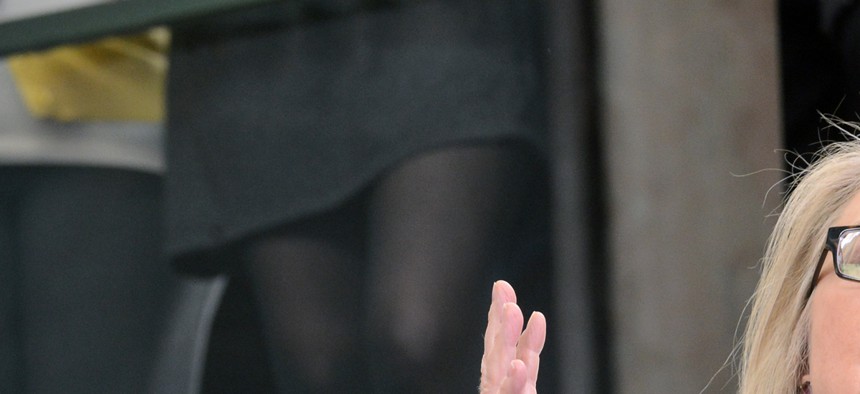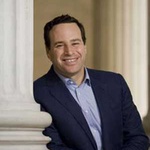
State Department file photo
Jeb Bush's Presidential Hopes Are Bad News for Hillary
The former Florida governor may or may not be a strong candidate, but his presence brings out the Democratic frontrunner's biggest weaknesses.
Tuesday was a good day in presidential politics for Republicans—but not for the reason you might first think.
Jeb Bush may or may not prove a strong national candidate. He may or may not be able to reconcile party base and party elite. But what he has already done is focus the presidential race on a series of questions maximally threatening to the leading Democratic candidate, Hillary Clinton.
Question one: the dynasty question. Jeb Bush is a man of considerable accomplishment, a two-term governor of a major state. On the other hand, Republicans don’t exactly lack for accomplished governors. It’s his name and extraordinary inherited fundraising advantage that qualify him as a first-tier candidate. Doesn’t that advantage symbolize something worrying about American politics and American society? And doesn’t every such question about Jeb Bush apply even more strongly to Hillary Clinton? She’s a person of accomplishment too, of course. But who believes she’d be the massive favorite for the Democratic nomination if her name were still Hillary Rodham?
Many Americans feel that their society has become less mobile and less fair over the past 20 or 30 years. Nothing would symbolize a narrowing of opportunity more perfectly than a Bush-Clinton race. The discomfort Americans feel with that image won’t affect Jeb Bush alone. And if Republicans end up rejecting him in favor of a more self-made candidate—a Scott Walker, say—won’t that put ideas in many Democrats’ heads that they too can choose their leaders rather than inherit them?
Question two: the personal-finances question. Mitt Romney is reported to have said that if Americans were disturbed by his Bain fortune, just wait till they discover what Jeb was doing at Barclays. But if voters are scrutinizing who was paid what, and why, they’re bound to pay closer attention to the Clinton-family finances. Since leaving the presidency, Bill and Hillary Clinton have been paid a combined total of more than $100 million, mostly for speeches delivered to audiences in the United States and abroad. Hillary Clinton credits these earnings to hard work. And yes, it must be wearying to travel around the planet to perform before audiences. But let’s not be naive. What’s being sold here is the prestige of the presidency and access to a potential future president, on an unprecedented scale. The whole Clinton enterprise is an institutional conflict of interest. Bill Clinton collected fees as his wife served in the Senate, able to affect legislation. He collected fees as his wife prepared to run for the presidency. He collected fees—often from international audiences—as his wife directed the foreign policy of the United States. They have both collected fees on the expectation they may return to the White House. As Democrats prepare their opposition research on Bush’s business dealings, they may begin to wonder: Maybe we could use this stuff more effectively if we chose a candidate who hadn’t done much, much, much worse?
Question three: the financial-crisis question. The worst financial crisis in U.S. history erupted under President George W. Bush. Democrats won’t let voters forget that. But the key decisions that enabled the crisis were made during the Clinton years: the decision to allow federally insured banks to enter investment banking; the decision not to regulate derivatives trading; the decision to relax mortgage-credit standards at Fannie Mae, the federally backed mortgage agency. The bank that received more bailout funds than any other, Citigroup, was chaired by former Clinton Treasury Secretary Robert Rubin at the time of the crash. Rubin earned more than $115 million during his tenure there, a period in which Citigroup received some $45 billion in bailout dollars.
In her speeches on the financial crisis, Senator Elizabeth Warren gently reminds her Democratic audiences that the catastrophe was at least as much Clinton-made as Bush-made. "Three of the last four treasury secretaries under Democratic presidents have had close Citigroup ties. The fourth was offered the CEO position at Citigroup, but turned it down." Maybe Warren is not the only Democrat to remember. As the debate over the Bush record intensifies, so will attention to the vulnerable portions of the Clinton record.
Question four: the turn-the-page question. Democrats often mock Republicans as the party of the old and out of date. Republicans nominate septuagenarians like Ronald Reagan, Bob Dole, and John McCain; Democrats nominate spry 40-somethings like John F. Kennedy, Bill Clinton, and Barack Obama. The presidential campaign of yet another Bush epitomizes the Republican tendency to look backwards. Yet Hillary Clinton, who’ll be nearly as old on Election Day 2016 as was Ronald Reagan on Election Day 1980, epitomizes an equivalent Democratic tendency—and even more so. “To those who say it was never so, that America's not been better, I say you're wrong. And I know because I was there. And I have seen it. And I remember,” Bob Dole said in his acceptance speech at the 1996 Republican Convention. Hillary Clinton likewise rests her political case on nostalgia for days gone by, in her case, the 1990s. Republicans understandably speak to the old: Those are their voters. Democrats need to mobilize the young. The more often Democrats hear the 2016 race compared to that other Bush-Clinton race a quarter-century ago, the more they’re liable to wonder: Shouldn’t the party that talks most about “change” be able to offer something a little more fresh?
Jeb Bush’s views on immigration and his plainspoken discomfort with his party’s Tea Party base make finally cost him his the Republican nomination. But make no mistake: He’s not the only vulnerable frontrunner here. After a few months of hearing the case against the other side’s entitled political dynast, will submissive Democrats at last be emboldened to rise up against their own?
NEXT STORY: The Complete Guide to Sitting at Your Desk







